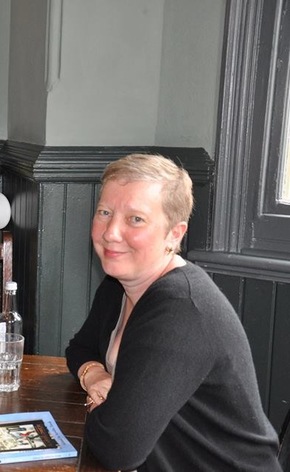Julie-ann Rowell
|
Julie-ann’s first pamphlet collection, Convergence, published by Brodie Press, won a Poetry Book Society Award. Her first full collection, Letters North, was nominated for the Inaugural Michael Murphy Poetry Prize for Best First Collection in Britain and Ireland in 2011.
She has won many prizes including first prize in the Frogmore Poetry Competition and The New Writer’s short collection competition. Also commended in the BT Section of the National Poetry Competition 2000, and the Bridport Prize, shortlisted in the Open Poetry International Sonnet Competition, Wells Festival Poetry Competition, Writer’s Inc, Ware Poets and Mslexia Poetry Competitions (twice) as well as being published in many magazines and journals. She has poems in several anthologies. The latest anthology to include her work, Furies, edited by Eve Lacey, was runner-up in the Saboteur Awards 2015. (Published by For Books’ Sake.) Julie-ann is currently taking part in a project providing poems for an interactive mobile app which will map and provide information on sites in Bristol connected to Romanticism. This is organised by the Department of English at the University of Bristol and will be available in the summer of 2015 as part of their conference on Romanticism in the South West. She has been teaching poetry in Bristol for eight years and also mentors and offers critique. Her particular interests include ecopoetry. Her latest sequence of poems on the artist Andrew Wyeth is featured in the new literary journal, Raceme; see www.racemepoetry.com. Julie-ann is also on the ExCite committee which organises the annual Exeter Poetry Festival. For more information, please see her website: www.jarowell.co.uk |
We talk of Seasons
i. Summer
The courtyard is a perfect grid
speckled with leaf and twig, edged
by pink geranium and mint; an invitation.
Somewhere a bird is trapped I believe
in a chimneybreast or attic vent,
the sound of escape, fleeting.
I know a kind of glory in the lane
beside the common vetch. She told me
she could smell it even as she slipped under.
ii. Autumn
Light pickles the morning, unexpected heat
gives way and flames my face. Cupid
is safe in her stone valley.
I’m pestered by talk of wreaths:
my friend’s must be willow and bindweed.
I won’t have this conversation.
The days dwindle and flutter out,
until November grinds and grins
its supple way into our gristle heads.
iii. Winter
The lawn is drenched, the pool a diametric.
I couldn’t foresee the storm.
The electric sky of dawn brings depth.
Rain beat on the skylights, tore at
guttering; plugged the drain. I haven’t
heard a songbird for days.
She’s home again lying in a bed of leaves.
I listen for her in the wind stream,
a drop of hurt. Last night I held her hand.
iv. Spring
The days lean back and she rests
in the conservatory. Her eyes are
a sacred blue. The sky is a pattern book
we cannot choose from. I try to imagine
the day, when it comes, and it is
impossible. But the winter did fade,
and die, light fitted the window,
measured the table where her teacup stands,
the smudge of her lip on the rim.
(Acumen, Number 81, January 2015)
Photograph by Shomei Tomatsu,
Museum of Modern Art, New York
Black and white, it resembled
a carcass on a hook,
the kind of image Francis Bacon
would have coveted, owned up to:
human or animal, origins uncertain,
could be either in its twist of gut.
I was surprised then when I checked
that this melting meat wasn’t flesh,
but glass – a beer bottle no less,
moulded into this shape
by the atomic blast of 1945.
Rescued from a site no one now
could recognise. Buildings rise
again and children are born.
The earth shuddered, continued.
A beer bottle lost any sense of what it was.
(The Reader, Number 54, Summer 2014)
On the day I didn’t know
The street was quiet on the day I didn’t know.
Pigeons went about their business along the windowsills,
the high street just as steep, the river on its way below,
the sun hidden, then re-emerging to soften the early chill.
On the day I didn’t know, I dawdled on the hill –
I couldn’t up the pace, lift myself, the usual shops
held no interest. Too much time to kill.
A busker sang a baleful tune, I didn’t stop
to hear his reason for the day. I reached the top
of town and found a place to buy a drink,
a compromise to help me home and swap
my dullness for reward, anything so as not to think.
On the day I didn’t know, at home I locked the door.
I emptied ashtrays, fed the cat, and mopped the floor.
(Hand Luggage Only anthology of the Open Poetry 2007 International Sonnet Competition)
On Walking to Iken Church
The moss so soft in its pockets,
the reeds sometimes like violin string,
pink-footed geese in a frieze
and then honking, how they flew
so perfectly. I heard movement
in the reed beds and stopped to listen,
but whatever it was froze too, listening,
and we were trapped in our worlds
of path, hidden pathway, waiting for
the other’s decision. The reeds
were taller than I was, as close
as rumour, creaking salutary
notes. They performed their
cover-up well. I wished I was
as clever. I took a step forward
and this was more than enough to tear
the silence – this lumbering life
cart-horsing itself through
the delicacy of the marshes.
The church the only human
perfection, perched upon
its no-longer island above the reeds.
(Island Review online magazine, 2014)
